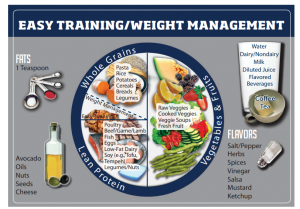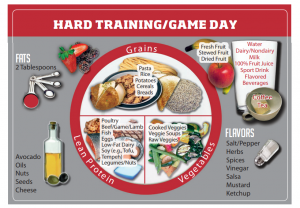by Julie Harris, RD
Proteins vs. fats vs. carbohydrates. Despite what the media wants you to think, you need all three. And if you’re training for an endurance event, you especially need carbohydrates. For those of you who made it to Education Night, we reviewed the biochemistry of the macronutrient, the research, and the recommendations. Here, I’ll provide a high-level overview of why carbohydrates can improve your endurance performance.
Research has continued to demonstrate that when endurance athletes eat more carbohydrates, they are more efficient and are faster athletes. In 2014, a meta-analysis of 61 published studies was reviewed. The review showed that 82% of the studies suggested that higher carbohydrate intake is statistically significant with improved performance benefits and longer exercise times.
Have you ever wondered what elite Kenyan distance runners eat? In 2004, Onywere, V.O et al reported total energy intake was nearly 3000 calories and 76.5% of those calories were from carbohydrates, 13.4% from fat, and 10.1% from protein. These are just a few examples of how research shows higher carbohydrate diet is beneficial for endurance performance.
The biochemistry supports this theory as well. Your body can use all three macronutrients for energy. Both carbohydrates and proteins provide 4 calories of energy for every 1 gram of nutrient consumed. And fat provides you with 9 calories per gram of fat. The advantage of using carbohydrates for energy is that your body prefers this macronutrient for energy so it is the most efficient way to generate energy for your brain and your working muscles. There are advantages for using protein and fat in other cases but neither outweigh carbohydrates when it comes to endurance training.
When you eat carbohydrates, your body either uses it right away for energy or it converts it into glycogen and stores it in the muscles and liver. Then, when you begin to move your body and increase your energy needs, your body utilizes those glycogen stores to produce continuous energy for your working muscles. Studies have shown that athletes who have higher amounts of glycogen in their muscles can run for longer. Studies have also shown that you have to replenish those storage units with carbohydrates; fats and proteins do not contribute to glycogen stores.
Every person is different with the exact amount of carbohydrates they need. And the primary varying factors are your weight and training levels. The chart below provides the recommendations for daily carbohydrate needs for endurance athletes.
| Daily Carbohydrate Intake Recommendations | ||
| Amount of exercise | Grams CHO / pound |
= Calories of CHO / pound (1 gram of CHO = 4 calories) |
|
Moderate exercise (~1 hour/day) |
2.5 – 3.0 | 10 – 12 |
|
Endurance exercise (~1-3 hours/day) |
2.5 – 4.5 | 10 – 18 |
|
Extreme exercise (~4-5 hours/day) |
3.5 – 5.5 | 14 – 22 |
Another way of making sure you are eating enough carbohydrates throughout your day to sustain your endurance training and events is using the Athlete’s Plates. The U.S. Olympic Committee has put together plates based on training levels. The varying factor on the plates is how much carbohydrates you put on your plate. So on easier, lower level training days, you decrease the amount of carbohydrates on your plate and increase the protein and vegetables. On days when you are training for longer time and distances, you decrease protein and increase carbohydrates. Take notice that on high mileage days, half of your plate should be covered in carbohydrates!
Your daily intake includes the carbohydrates you take in during your training. If you’re training longer than 45 minutes, recommendations are to eat 30-60 grams (120-240 calories) carbohydrates per hour. If you are training for more than 2.5 hours but lower to moderate intensity, eating at least 30 grams (120 calories) of carbohydrates per hour is needed to sustain your muscles. When those training runs are higher intensity, increase to 60-90 grams (240-360 calories) of carbohydrates per hour. These are general guidelines and a lot of endurance athletes have to experiment with the types and the amounts of carbohydrates that work for them during endurance training and races.
Carbohydrates are an essential nutrient for endurance athletes. Trial and error can play a huge role in determining the right amount of carbohydrates needed to maintain and improve your endurance performance.



